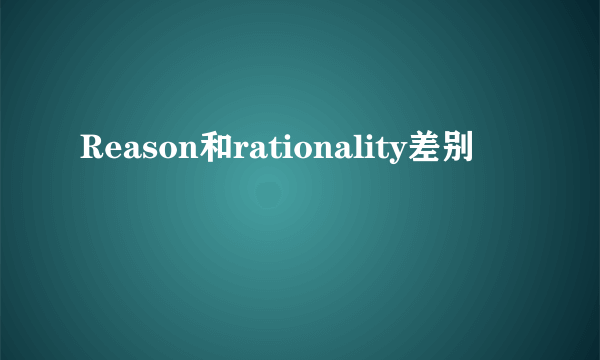Reason和rationality差别
的有关信息介绍如下:
在哲学中,经常会遇到reason或者rationality,两者都有“理性”或者“合理性”的意思,但是如何区分,在意思和用法上有何区别,却一直很困惑,只是知道在说“科学合理性”等问题时,应该用rationality,却不知所以然。在给美国教授发圣诞祝福的同时,我捎带着问了一下这个问题。教授的回答应该对我还是很有启发的,转发到这儿来,希望对其他看到的同事和学生也有启发。Dear Liyun,Thank you so much for your holiday wishes. I hope you too are having a wonderful holiday season -- although this probably is not when people in China celebrates the coming of a new year. Overseas Chinese observe the lunar new year, also called the "Chinese" new year, but I'm not sure about China. In any case, all these holidays seem to come during the winter (at least, in the northern hemisphere).You ask about "reason" and "rationality". These terms can refer to the same thing, namely the faculty, or capacity, to think and act "rationally" or, as people say, "logically". The term "rationality" is more commonly used for this purpose. But in Kant's "Critique of Pure Reason", the term "reason" is used to refer to this rational capacity and its exercise.More commonly, though, "reason" is used to refer to purposes or causes that justify actions -- in view of which actions are seen as "rational", "reasonable", or "logical". My desire for food is a reason, in that sense, of my stopping at a restaurant; it justifies my action. My believing that it is snowing outside is a reason for my decision to stay home. And so on.Does this make things a bit clearer? If not, do get back to me with more specific questions if possible.It's snowing outside -- light, fluffy snow. Quite beatiful all around, but it makes it a little difficult to get around. It's quiet, beautiful, and peaceful. (看到这段话我会心一笑,想起了去年几乎每周都要下雪的那个冬天,那个被白雪覆盖的童话一般的纯白世界,只有清扫出的小路和车辙,一切都是那么纯洁、静谧而美好。也记得以前跟Kim通信的时候,他提到每年的5月是很漂亮的季节(原话是,“As you will see, May is very nice around here; the entire College Hill area will be drenched in flowers and trees blooming all over the place.”),便想起那时满街满眼的小花以及那些“开花的树”(如樱花树、玉兰等)……类似的情景太多了。Kim的话总是那么situated,嵌入那些情境之中。我想那些个场景一定会一直留存在我的记忆中,每一次回忆都会带来一次新鲜的感动。)All good wishes!Jaegwon KimP.S.: 很喜欢这个教授的语言,用美国学者描述他的著作的词,就是“lucid style”(明白晓畅的风格)。不知是不是与这位教授的亚洲血统(韩国裔)有关,跟其他的回信非常casual的美国教授比起来,他的回信总是显得非常细致、到位和妥贴。关键是作为在美国非常有名望的哲学家(能在美国的人文学科做到院士的亚洲人屈指可数),Kim做人非常谦和,令人敬佩。他现在的主要研究领域是心灵哲学和行动哲学,坚持的是英美分析哲学的传统,对我们这些更多受欧陆哲学传统影响的人来说,研究方式和言说方式都有些隔膜,从头学起对我来说也有点不现实,不然的话真该做一些他有关著作的译介工作。看过他写的学术专著,也听过他讲的两门课,感觉他对问题的梳理非常清楚,文笔也非常晓畅,对问题的解读更是有独到的视角,只可惜我这方面的研究薄弱了一点,只能就一些研究方法、大的议题以及小的知识点进行请教,不能传承他的衣钵于万一,这一直是我觉得比较遗憾的事。




















